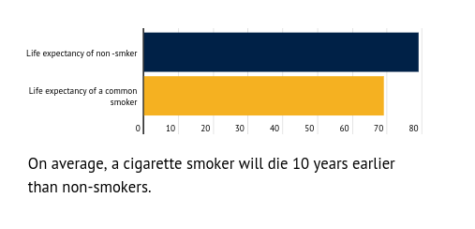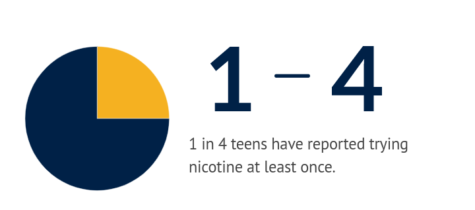Banning nicotine flavored products won’t solve teen vaping issues
It’s fair to say the intent behind the government’s ban of certain flavored nicotine products will succeed in cutting down some of the teen vapers, but a deeper dive into the law will show that it won’t stray nicotine addicts away from nicotine. If anything, the law will drive people back to cigarettes and unravel the progress made in the United States. The JUUL has been one of the leading causes in the decrease of cigarette smokers in the US.
According to JUUL labs, The JUUL was made in 2017 to cut down on the number of cigarette smokers and prevent the 480,000 deaths related to cigarettes every year. Cigarettes have been a big problem in the US historically, killing many people prematurely. On average, a cigarette smoker will die 10 years earlier than non-smokers, and more than 16 million Americans live with diseases related to cigarette smoking. So if there is an alternative and safer way someone struggling with nicotine addiction can get nicotine it should be seen as a good thing.

Unfortunately, since 2017 the number of teens and children using nicotine has increased, to the point where it can be considered a national epidemic. These increases in numbers can be associated with the introduction to JUUL and other nicotine-related products.
On the surface, these bans seem like a highly efficient way to battle teen nicotine addiction. These products are potentially fatal to the user, need restrictions and need to be kept out of the hands of teens. By eliminating the flavors that attract teenagers, there should be no reason for them to continue to vape. Unfortunately for people struggling nicotine addiction banning these flavors will just drive many back to the even more harmful and deadly product that led to their addiction, the cigarette.
The fact is, the goal of JUUL and other e-cigarettes is to stray people away from cigarettes. If these flavors that are supposed to convince them to stop smoking cigarettes are banned, what reason would someone have to quit? According to the CDC data, cigarettes kill more people than any E-cig product on the market, so this alternative is beneficial to our society and saves thousands of lives.
The problem with the E-cig business isn’t the flavors, it’s the marketing and distribution. One flavor distribution company that is guilty of marketing to kids is Candy King E-Juice. Looking at the packaging alone, you can tell why kids would be drawn into the product. The packaging on certain flavors is made to resemble the packaging many popular candies come in. For example, their Candy King Batch is made to resemble a Sour Patch Kids package, and their Candy King Swedish is designed to look like a bag of Swedish Fish. This is what draws teenagers in: by creating a resemblance to candy, the youth is more likely to purchase that product.
This marketing technique used by companies not only attracts teens but the youth too. In 2018, the FDA warned many companies whose products resemble kid’s snacks to change their packaging, but the companies only made minor changes, and their product can still be clearly associated with those snacks.
The real way to cut teen addiction is to make laws that fix these problems. If the government made laws that focused on the marketing of these flavors instead of the flavors themselves teen nicotine addiction would drop, and the people struggling with addiction will still have their safer alternative available to them.
The biggest problem related to teen vaping comes in the distribution. According to North Carolina law, a person who wishes to purchase a nicotine product must be 18. Unfortunately, many tobacco and vape shops don’t follow these laws and will sell to minors without asking for an ID. If the main focus becomes cracking down on these shops, then the number of nicotine products in the hands of teenagers will decrease.
It is unethical that these stores willingly sell to minors without asking for ID. There are many stores in Charlotte and around East Meck that do this. This is the real reason for teen nicotine addiction. The stores only have profit in mind and they know teens will come and buy from their stores time after time if they know they can get their products. It needs to be stopped and these stores who have violated the laws already in place need to be held accountable for teens access to nicotine.
It is not fair to the companies that these businesses get away with selling to minors and the company gets punished for making flavors to help former cigarette smokers. While the companies should take part of the blame they should not be forced to stop producing their products due to the violations distributors make.

While this new call for action may cut down on the number of teen nicotine abusers, it will also increase the number of people who return to cigarettes. There are more important aspects of the vaping industry that need to be looked into and until we, as a nation, can recognize the real problem, teens will find a way to get a hold of nicotine products.
Your donation will support the student journalists of East Mecklenburg High School. Your contribution will allow us to purchase equipment and cover our annual website hosting costs.





